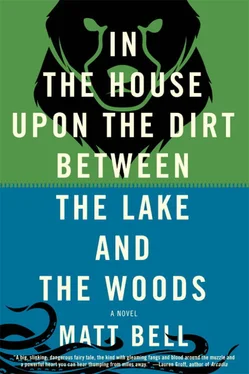KILL THE BEAR, the squid said. MAKE FRESH THIS WORLD ONCE AGAIN.
After I refused its offer, the squid opened my skin with its hooks and slammed its snapping beak into my chest, and even though the squid was a ghost, still it was powerful there in the lake-black: With sharp movements, it set to folding back the sheets of my skin, splitting some numbers of ribs and also the tissues between. It pushed forward, and my body bulged to accommodate its entrance, its puke-yellow eyes leading the strange wedge of its alien face, and then I was speared upon its sharp ridges, and then the fingerling was pushing back from all his holdings, and between them or upon them I was caught fast and screaming, thrashing against the squid’s attack, its refusal to accept my declining of its barely bartered truce, and for a while we spiraled deeper into the depths of the lake, a black made of the squid’s ink and also something else, where there was no sound and sight, where even our battle was subsumed into the silence, and where I burst against the cold and the dark until I was reduced to a held breath, a bit of bodily heat, a movement slowed and almost stopped. Still the squid-ghost swam on, not farther down but farther in, into me, trying to squirm its ghost into the spaces I contained, that space that in me was already filled with my own fractured haunts, my cancer-son, and would admit no other.
The squid’s shape was so heavy, so thick with ropes of ink now pushing into me too, and as I dropped through that black I dreamed a squid’s dream: I had not one child but thousands, all same faced as me, all hatching out of the lake at once, from both the egg clutch along the shelf ridge and also somehow from out of my arms, out of my legs, from out of my mouth and ears and nose, all little stars bright with tentacles and sharp black mouths, all floating upward toward the light.
The weight of the squid weighed upon me, and as I watched my dream-children swim off I sank deeper into their making, and in this dream I saw my life did not end with my death but rather went on, spread wide across the face of the world, my children a country of men and squid, so that everywhere there was lake we were there, and everywhere there was dirt there was a man sent to build his house upon it.
Throughout our fall the fingerling fought the squid from every inner space, pushed back with his many tumors, and soon the squid balked, struggled to withdraw, wriggling its barbs backward. Outside my body again, the squid swam long curves around my sinking weight, its angry shape first invisible in the black, its voice now lower than words, untranslatable even by the fingerling, and then again it was upon us, slashing with beak and claw, and as we fell, the depth’s pressure squeezed my lungs until they broke further, filled with ink, burst again.
How tired I was of almost dying, of suffering the sequenced steps without release: Here was the cold, the dark, the black, all around me and inside, and here was my crooked foot and my dented head or neck and all the rest of my hook-scraped and beak-burst body, and still I did not give in, still some part of me scratched forward, succored for life, for even what sorry life I had waiting. I reached into my boot for my blade, my knife dulled with decades of skinning and scaling, and as I drowned deeper I fought back, put the single sharp edge of my blade against the squid’s soft shell, and together we sank through another fathom of struggle before it tried again to whip me toward the crook of its stained beak, before I raked my knife across one tentacle and then the other, before I plunged it toward the squid’s eye—that eyeball alone the size of my head—and in the dark I moved the knife into the black at the center of its glimmering iris, into and then through that ring of light, pushing the knife so deep my wrist disappeared into the shell behind, and somewhere within the knife finally caught, then wrenched from my grip in a wet squelch of ichor—and still I knew I had not ended the squid, what ghost remained of this once-father.
Not to have killed it but to have at least made half of it dark.
To have at least made that half black , blacker, and then to have that part and others broken, made a scrim swimming all around me, a body floating like a shroud.
MEMORY AGAIN AS TRANSFORMATION, AStransfiguration: to swim or else float or fall inside the tearing-apart, to be joined with this squid-thing, this whale-thing, this desperation that could be either a squid or a whale, that in one of its shapes the bear had ended. And still it went on, and amid my dispersal swam the squid’s anger, its own remainder, fury at how it could not enter my cavity, and if it could not claim the inner chambers of my body, at least it could reshape the shell.
The fingerling was already familiar with this squid’s motion, swimming and tentacled and inky black, and I was made that swimmer’s shape too, and soon my breathing stopped being one kind and became another, and by that change I finally came to believe what I had been told: that despite our too-many numbers there were always only two, and that those two begat no true offspring, because it was always the same two that appeared, in this and in every age, and yet everywhere on this dirt there were too many.
AFTERWARD, WHAT OTHER POWER LEDme up through the shallower lake, what glowing guide except the light of the moon? Not my wife’s moon, shattered and fallen, but that other again made lonely above the earth, its long light cutting even the ink-water of the new lake, making floating ribbons shimmering around this new body, shorn and reshaped, this face different now beneath the water than it had been above.
As I ascended, the fingerling taught me the motions this shape necessitated, the jetting this way and that, choosing a path zigzagged upward through the layers of coldest and then colder and then just cold. For a long time, he urged me to stay away from the surface, but I did not understand his hesitance until after I burst the plane between salted ink and rain-soaked air: Beneath the water I would always be squid, would take on the role hollowed out for me by the long-ago aggression of the bear, but above I would for some time longer be only myself, only failed husband, broken father.
At first I waited there, tried to be both, to have both, but the fingerling denied me, pushed me to pick. NO, he said. YOU CANNOT ALWAYS WANT TO HAVE EVERYTHING.
Diving back through the lake, I snatched at schools of fish and passing eels, feastings for me and my son, and as my new shape swelled, the fingerling swam within me; his shapes changed too, constrained by my shifting, and for some time we moved together, and after our hungers were satisfied I began our gradual shearing of the surface, and when we broke again the plane of the lake’s surface it was to find the rain softened, the wind reduced, the waves manageable even in the dark, the first true dark in many years. From the surface I searched the shoreline with my human eyes, then as the squid I dove below to swim in toward the shallows, on the way checking the shelf and what lay between the shelf and the shore for any sign of the foundling, finding none except some scent of his blood, some taste of his vomit, and also of salt and fish and bile reduced, traces I imagined discernible only to my new and watery senses.
And then for a moment not to care so much about the foundling, at least not the foundling as a boy, which was not the shape of son my new shape craved.
And then to want to swim back into the depths, the deep and deeper lakes where my body would stay as perfect as any other swimming creature’s, at last ideal for what activities I would put it to, evolved right.
All I had to do was choose the lake over the land forever, and then I could be a new thing, a squid first and a whale after, and for a moment I knew how the one who came before me had arrived at his station, and also what he had traded to claim it.
Читать дальше












